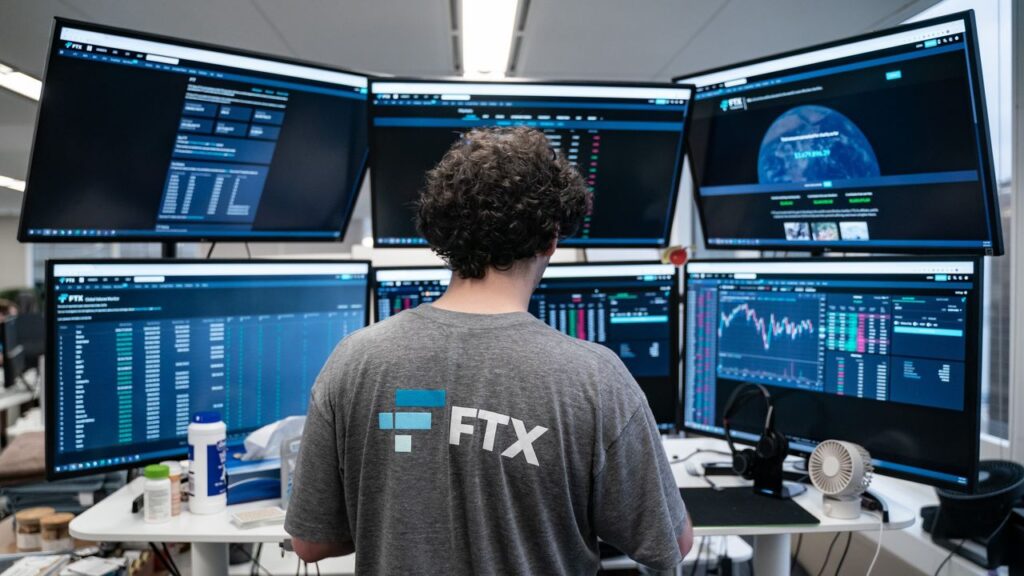Every crypto enthusiast wants to invest in crypto and earn passive income. The main task is to find reliable tools for this. One of the most profitable ways to make money in the crypto world is Staking. Let’s briefly check out the core opportunities of the feature and how it works with examples.
Understanding Crypto Staking
Blockchain security is a major thing for the entire digital world. In 2012, developers invented Staking, a blocking of digital money to improve network security. The new Proof of Stake (PoS) algorithm provided proof of ownership and created a unique way to earn passive income. Thus, by holding the cryptocurrency in the system, you invest in the network’s security and receive a reward.
How to Earn With Staking?
Let there be a certain cryptocurrency in your portfolio. To start Staking, you need to choose the right crypto platform. Determining key factors such as profit, limits, withdrawal flexibility, and various cryptocurrencies is important.
Limits determine the amount of cryptocurrency required to start Staking. The income is calculated by the values of APY (annual percentage yield with compound interest) and APR (annual interest rate with a certain commission).
For example, BetFury, an ecosystem of crypto products, offers Staking with up to 50% APY. You should have 100 BFG (BetFury utility tokens) to qualify for the reward. Withdrawals are paid in BFG tokens or five top currencies (USDT, ETH, BTC, BNB, and TRX). When choosing a BFG, the payouts will rise over time due to the increase in the holding amount.
Therefore, this mechanic is potentially profitable and simple. It allows all crypto enthusiasts to enter the investment journey and earn digital assets effortlessly and easily.
Why is it Convenient and Safe?
The income generation period can be blocked for a specified period or flexible. The first involves the possibility of withdrawing the holding currency after a week, a month, or even a year. In the second case, there is the freedom to withdraw funds at any time. The BetFury platform discussed above offers Staking with daily rewards. This means that cryptocurrency can be withdrawn every 24 hours. This scheme is the most convenient because it does not provide for a long wait.
Staking is a transparent process that promotes a symbiotic relationship between Stakers and the network. It means that the benefits work for both sides. However, don’t forget about your security, which directly depends on the choice of the platform. Reliable companies minimize potential risks through partnerships with recognized organizations and a convenient payment system. In this case, you are not threatened with losing funds, and the mechanism will operate clearly, like clockwork.
Benefits and Drawbacks of Staking
Each crypto feature has advantages and disadvantages. Let’s highlight the main points for Staking.
Staking Upsides:
- High passive income with good investment
- No need for expensive equipment.
- Risk minimization relative to standard trading.
- Ownership of company assets and an integral role in projects.
- Global use of funds on exchanges.
Staking Downsides:
- Probable periods of blocking funds.
- Price volatility when receiving cryptocurrencies.
- Possibility of burning out by choosing an unreliable platform.
How to Make Staking the Most Profitable?
If you want to Stake crypto most efficiently, itʼs important to choose a promising currency and a reliable platform. Not only the amount of passive income will depend on this, but also the security in general.
When choosing a cryptocurrency, you should consider such aspects as volatility, the number of holders, circulation volumes, availability on top exchanges, etc. For example, the BFG token participating in BetFury Staking has a fairly stable price and more than 55 000 worldwide holders. After the end of Mining, the total emission was five billion tokens, and the circulation was more than three billion. BFG is listed on top exchanges such as ApeSwap, Bogged Finance, and others. In addition, the platform held more than 40 monthly Burnings to balance the ecosystem and increase the exclusivity of the currency. Therefore, it indicates the strong potential of BFG and makes it a great Staking crypto.
Over three years, BetFury has paid out over $84 million in Staking. An extensive user base has recognized a variety of crypto payouts and all possible amenities. Over 50% of the internal platform’s currency is owned by crypto investors, which plays a key role in the project’s success. In addition, beginners are offered a Welcome Pack that is easy to start Staking with. Sign up on BetFury to get $3 500 and 1 000 Free Spins for iGaming.
To sum up, Staking presents a remarkable avenue for getting digital money. The transparent mechanics of holding currencies on platforms like BetFury will help you quickly navigate the Staking landscape and reap the rewards.
Singapore-based cryptocurrency exchange Vauld, which has been embroiled in bankruptcy proceedings since August 2022, has announced a pivotal development in its journey towards recovery.
The company recently received court approval to initiate a comprehensive restructuring of its board, signifying a significant step forward in its efforts to stabilize and rejuvenate its operations.
Co-founder of Vauld, Darshan Bathija, took to social media platform X (formerly known as Twitter) on August 24th to reveal that the company’s proposed scheme of arrangement had successfully gained judicial endorsement within a Singaporean court.
As per the approved scheme, Vauld’s current board is set to undergo a transformative overhaul.
The restructured leadership will include a fresh Chief Executive Officer (CEO), a representative chosen by the creditors, and a capable scheme manager.
In a demonstration of its commitment to regulatory compliance and operational integrity, Vauld has reinitiated the Know Your Customer (KYC) verification process for its existing clientele.
These clients are now required to resubmit their verification documents, marking a concerted effort to enhance transparency and security within the platform’s operations.
The company’s plight was catalyzed in August 2022 when Indian law enforcement seized a substantial sum of $46.4 million from Vauld’s Indian subsidiary, Flipvolt Technologies.
This action was spurred by allegations of money laundering, further exacerbating the exchange’s financial challenges.
Vauld faced an array of obstacles, including the temporary suspension of customer withdrawals in July 2022.
This measure was attributed to both unfavorable market conditions and a significant withdrawal surge, amounting to $200 million.
READ MORE: New DeSo Network Friend.tech Generates Over $1 Million in 24 Hours
The company’s financial turmoil was exacerbated by losses linked to the declining values of major cryptocurrencies, as well as its exposure to the beleaguered stablecoin TerraUSD (UST), which suffered a collapse in May 2022.
Following these setbacks, Vauld was granted a three-month moratorium in August 2022 to devise a viable restructuring strategy.
An initial proposal suggested an acquisition by Swiss crypto lending entity Nexo, though negotiations with Nexo were terminated in January 2023.
Amidst these ongoing challenges, Vauld obtained successive periods of creditor protection from Singaporean courts.
The company’s outstanding debts, totaling around $400 million, primarily encompass funds owed to individual depositors.
With the court’s approval of its restructuring plan, Vauld is poised to embark on a transformative journey under new leadership.
This pivotal juncture could potentially pave the way for the exchange’s resurgence and the restoration of trust among its stakeholders.
Other Stories:
UK Prime Minister Allocates £100 Million to Acquire Computer Chips for AI Advancement
Bitget Cryptocurrency Exchange Enhances KYC Procedures to Align with Global Regulations
Ordinal Inscriptions Maintain Dominance on Bitcoin Network Despite Price Dip
Galaxy Digital, helmed by Mike Novogratz, appears poised to oversee the remaining cryptocurrency assets from the defunct FTX cryptocurrency exchange.
On August 24, Galaxy Digital submitted a motion to the US District Court for the District of Delaware, seeking approval for protocols governing the sale of digital assets recuperated during the ongoing bankruptcy proceedings.
The filing details FTX’s intentions to transfer approximately $7 billion worth of recovered cryptocurrency tokens to Galaxy Digital’s management, subsequent to FTX’s collapse in 2022.
FTX aims to arrange for the potential sale of its cryptocurrency reserves and stake tokens through Galaxy Digital, as outlined in its preliminary proposal.
This approach is underpinned by a comprehensive strategy to manage and monetize the cryptocurrency assets, intended to mitigate volatility exposure and potential fiat repayments to creditors.
FTX plans to retain Galaxy Digital’s services as a registered investment adviser, leveraging the firm’s specialized expertise in digital asset markets to optimize the valuation of its token portfolio.
The partnership offers several advantages, including the ability to anonymously offload holdings in the markets and reduce susceptibility to market manipulation.
Moreover, FTX envisions Galaxy Digital playing a critical role in assessing timing, trading platforms, and counterparties for prospective transactions.
The investment guidelines established will lead Galaxy Digital to sell various digital assets owned by FTX, while also managing Bitcoin (BTC) and Ether hedging prior to potential sales.
FTX’s strategy encompasses liquidating crypto holdings for fiat currency to minimize exposure to market volatility.
READ MORE:Bybit Unveils NFT Collection as Part of Velocity Series
Concurrently, leveraging liquid hedging markets for Bitcoin and Ether aims to mitigate the impact of unexpected price fluctuations before the assets are sold.
The filing also highlights FTX’s interest in Decentralized Finance (DeFi).
It plans to stake specific cryptocurrencies to generate passive income under Galaxy Digital’s guidance, stating that this approach will yield low-risk returns on dormant digital assets, ultimately benefiting the estate and creditors.
As the bankruptcy proceedings continue, FTX has recently proposed a restructuring plan that contemplates the establishment of a rejuvenated offshore exchange.
This initiative could provide creditors with the choice of reclaiming a portion of their lost funds or participating in equity, tokens, and other stakes within the rebooted FTX framework.
Other Stories:
FTX Founder Seeks Release for Defense Collaboration
Global Disparities in Bitcoin Mining Costs Highlighted: From $208,560 in Italy to $266 in Lebanon
SEC Lawsuit Stifles XRP’s US Adoption Potential, Pro-XRP Advocate Asserts Amid Coinbase’s Moves
Amidst the aftermath of Judge Analisa Torres’ ruling in the United States Securities Exchange Commission v. Ripple Labs case, which declared XRP not to be a security, the digital asset is grappling to maintain its upward trajectory.
This struggle has prompted some investors to offload their holdings, exacerbated by a substantial player in the market moving a sizable amount of 29 million XRP – equivalent to a value exceeding $15 million – to the Bitstamp crypto exchange.
This transfer has coincided with a decline in XRP’s price that is precariously approaching a crucial support level.
A recent announcement from Whale Alert on August 24 revealed the movement of a significant holder’s 29.3 million XRP tokens, valued at $15.13 million, to the Bitstamp exchange.
There are indications that this whale might be divesting its XRP assets, given its prior transfer of 14 million XRP to Bitso just a few hours earlier.
Judge Torres’ decision to allow the U.S. SEC to pursue an interlocutory appeal concerning XRP token sales has triggered a marked downturn in the market.
Consequently, the price of XRP has experienced a sharp descent, breaching vital support thresholds of $0.6 and $0.5.
Though XRP’s price is currently recuperating from the $0.5 support level, the specter of a substantial plunge looms if traders and prominent holders choose to liquidate their positions.
READ MORE: UK Prime Minister Allocates £100 Million to Acquire Computer Chips for AI Advancement
Meanwhile, the anticipated trial involving Ripple and the SEC is projected to take place either towards the end of April or in mid-May.
This timeline aligns with notifications from both the SEC and Ripple Labs, including CEO Brad Garlinghouse and Executive Chairman Chris Larsen, who cited their unavailability during the second quarter of 2024.
This development did temporarily boost XRP’s price; however, the bullish momentum proved short-lived.
In the past 24 hours, the value of XRP has encountered a decline exceeding 3%, presently settling at $0.51. Within this timeframe, the price has vacillated between $0.510 and $0.528.
Additionally, a decrease in trading volume has been observed over the same 24-hour period.
Other Stories:
New DeSo Network Friend.tech Generates Over $1 Million in 24 Hours
Ordinal Inscriptions Maintain Dominance on Bitcoin Network Despite Price Dip
Bitget Cryptocurrency Exchange Enhances KYC Procedures to Align with Global Regulations
Binance, a prominent cryptocurrency exchange, recently announced its forthcoming adjustment to the zero-fee Bitcoin trading program on August 24, a move that could potentially trigger a considerable market downturn akin to the significant trading volume slump of around 90% witnessed after Binance terminated zero-fee trading in March.
The exchange’s official statement disclosed plans to implement updates to the zero-fee Bitcoin trading, effective from September 7.
Binance’s focus is on modifying the zero-fee trading model for the Bitcoin True USD (TUSD) spot and margin trading pair.
Previously, traders enjoyed fee-free transactions, both as makers and takers, when participating in BTC trading with TUSD pairs. However, changes are afoot.
A standard taker fee will soon be in place, determined by the user’s VIP level.
That said, users will continue to encounter zero maker fees when conducting Bitcoin trades using the BTC/TUSD spot and margin trading pair.
Furthermore, the trading volume corresponding to the BTC/TUSD spot and margin trading pair will now factor into VIP tier calculations and various Liquidity Provider programs.
BNB discounts, referral rebates, and other fee adjustments will also apply once again to BTC/TUSD spot and margin trading volumes.
The decision to discontinue the zero-fee Bitcoin trading initiative for TUSD suggests waning support for the TUSD stablecoin due to various apprehensions.
READ MORE: FTX Founder Seeks Release for Defense Collaboration
Nevertheless, users will still benefit from zero maker and taker fees when engaging in Bitcoin trading through the FDUSD spot and margin trading pair.
Binance’s modification of the zero-fee Bitcoin trading arrangement for the BTC/TUSD spot and margin trading pair could inadvertently stimulate a fresh round of market selloffs.
CoinMarketCap data indicates that BTC/TUSD and BTC/USDT pairs are the most frequented options for Bitcoin trading, accounting for 11% and 7% respectively.
After Binance’s shift from BUSD to TUSD as the exclusive trading pair for zero-fee Bitcoin trading, trading volume in Tether (USDT) pairs plummeted considerably.
Once more, the exchange is steering attention away from the widely traded TUSD to the lesser-known FDUSD stablecoin.
Notably, FDUSD fails to secure a spot among the top 10 Bitcoin pairs by trading volume, and its market capitalization stands at $324 million.
Other Stories:
SEC Lawsuit Stifles XRP’s US Adoption Potential, Pro-XRP Advocate Asserts Amid Coinbase’s Moves
Global Disparities in Bitcoin Mining Costs Highlighted: From $208,560 in Italy to $266 in Lebanon
On August 22nd, Bitcoin exhibited a noteworthy departure from prevailing trends, as it gravitated towards the $26,000 mark, capturing the attention of intraday BTC price movements.
Despite being in a state of significant overselling, as indicated by the relative strength index (RSI), Bitcoin displayed an unyielding resistance to staging any form of recovery rebound from its levels last observed two months earlier.
Market participants grew increasingly restless, with prominent trader Jelle characterizing the intraday fluctuations as the ominous “death chop.”
Monitoring entity Material Indicators likened the current scenario to a high-stakes game of chicken, anticipating a decisive move that would break the ongoing choppy pattern.
A comprehensive analysis of liquidity within the Binance BTC/USD order book conducted by Material Indicators unveiled a general paucity of liquidity, thereby intensifying the potential for a sharp and abrupt price shift in either direction.
The entity elaborated on the prevailing situation on X (formerly Twitter), stating, “The market is in a state of anticipation, gauging whether greater bid or ask liquidity will be drawn towards this range.”
Despite observing minor increments of bid liquidity moving from the $20,000 threshold towards the active trading zone, no substantial liquidity – either freshly introduced or relocated – was found to be fortifying the range against a potential dip to a lower low (LL).
The implications were considerable, particularly for bullish sentiments, as a LL could jeopardize even the foundational support at $20,000.
READ MORE: SEC Lawsuit Stifles XRP’s US Adoption Potential, Pro-XRP Advocate Asserts Amid Coinbase’s Moves
Material Indicators underscored that the outcome would be of paramount significance, potentially driving BTC to levels below $20,000 if two consecutive LLs were to materialize.
On a more optimistic note, there remained a glimmer of hope that Bitcoin could reclaim its broader upward trajectory.
Michaël van de Poppe, the founder and CEO of Eight, a trading firm, emphasized the heavily oversold signals emanating from the RSI in a dedicated YouTube update on August 22nd.
Highlighting RSI measurements of under 19 on 12-hour timeframes, which were comparable to levels during the 2018 bear market nadir, and analogous daily measurements, which mirrored the lows witnessed during the March 2020 COVID-19 market crash, van de Poppe inferred that such downturns often precipitate a V-shaped recovery, culminating in equilibrium at a higher floor.
Anticipating a resurgence targeting $26,500 or beyond, van de Poppe articulated a distinct possibility of Bitcoin mirroring a trajectory akin to the prelude of the previous bull market.
Drawing parallels with the market dynamics of September 2020, Jelle alluded to a gradual ascent and absorption, echoing a pattern that could potentially unfold in the current scenario, thereby fostering an environment reminiscent of the commencement of the prior bull market.
Other Stories:
Bybit Unveils NFT Collection as Part of Velocity Series
Global Disparities in Bitcoin Mining Costs Highlighted: From $208,560 in Italy to $266 in Lebanon
A former Chinese government official, Xiao Yi, has received a life sentence for his involvement in illicit business activities linked to a substantial Bitcoin mining venture valued at 2.4 billion Chinese yuan (approximately $329 million).
This ruling was accompanied by additional convictions related to corruption charges. The Intermediate People’s Court of Hangzhou City pronounced the sentence on August 22.
Xiao Yi, a previous member of the Jiangxi Provincial Political Consultative Conference Party Group and vice chairman, was found guilty of corruption and abuse of power.
The corruption allegations primarily revolved around non-crypto matters, specifically bribery that spanned from 2008 to 2021.
In addition, abuse of power charges were based on actions taken between 2017 and 2021, where financial and electricity subsidies were provided to Jiumu Group Genesis Technology, a company located in Fuzhou.
Notably, this firm managed over 160,000 Bitcoin mining machines at one point.
Prosecutors argued that Yi orchestrated a concealment of the mining operation.
He allegedly directed various departments to falsify statistical reports and manipulate electricity consumption records.
During the period from 2017 to 2020, Jiumu Group Genesis Technology was responsible for 10% of Fuzhou’s total electricity usage.
The court noted that Xiao Yi admitted guilt, demonstrated remorse, returned embezzled funds, and all confiscated bribes and their profits were recovered.
READ MORE: FTX Founder Seeks Release for Defense Collaboration
China currently prohibits cryptocurrency transactions, exchange activities, and the conversion of fiat currency to crypto. However, complete ownership of cryptocurrencies has not been explicitly banned.
In a recent decision on August 3, a Chinese court invalidated a $10 million Bitcoin lending contract based on the country’s Bitcoin-related restrictions, precluding any legal recourse for debt recovery.
Additionally, on August 14, a Chinese citizen was sentenced to nine months in prison for aiding an associate in purchasing Tether, earning a $20 profit from the transaction.
In conclusion, Xiao Yi, a former Chinese government official, has been handed a life imprisonment sentence for his involvement in unauthorized business endeavors tied to a substantial Bitcoin mining venture and for corruption-related charges.
This verdict underscores China’s strict stance on cryptocurrency-related activities, while various legal actions continue to unfold in the country’s evolving regulatory landscape.
Other Stories:
Bybit Unveils NFT Collection as Part of Velocity Series
Global Disparities in Bitcoin Mining Costs Highlighted: From $208,560 in Italy to $266 in Lebanon
SEC Lawsuit Stifles XRP’s US Adoption Potential, Pro-XRP Advocate Asserts Amid Coinbase’s Moves
Former FTX CEO and co-founder, Sam “SBF” Bankman-Fried, has entered a plea of not guilty to charges of fraud and money laundering as stated in an updated indictment, reported recently.
The proceedings, presided over by Magistrate Judge Sarah Netburn, encompassed seven counts of fraud and money laundering, along with an added campaign finance charge.
Bankman-Fried asserted his innocence in regard to all allegations.
During the court session, SBF’s legal representatives raised concerns about his medical requirements.
They highlighted that SBF relies on Adderall and adheres to a vegan diet, both of which have not been met for the past 11 days. In response, the lawyers also requested that their client be provided with a vegan diet while in custody.
Furthermore, SBF’s counsel voiced apprehensions related to his ability to prepare adequately for the trial.
READ MORE: Crypto Industry Adapts to Bear Market
They noted that Bankman-Fried has been in remand since August 11 and expressed concern that they have only been presented with impractical solutions.
Bankman-Fried appeared before the Southern District of New York courthouse on August 22, facing allegations of using customer funds for personal gains and political contributions.
While the charges for fraud and money laundering date back to December, additional campaign finance charges were included by the prosecutors earlier in the month.
This series of developments follows the decision to revoke Bankman-Fried’s bail, leading to his departure from the New York courtroom in handcuffs.
Earlier in the week, SBF sought permission from the court to spend weekdays outside of detention in order to collaborate more effectively with his legal team on his defense.
A federal judge overseeing the criminal case granted him the ability to meet with his legal representatives outside of jail for approximately seven hours, allowing some flexibility in his preparations for the upcoming trial.
Other Stories:
Binance Contemplates Legal Action Against Former Payment Provider
Ripple Labs vs. SEC: Appeals Process Sparks Debate Over Ongoing Legal Case
Friend.tech, a new decentralized social (DeSo) network, has recently outshone giants like Uniswap and the Bitcoin network by generating over $1 million in fees within 24 hours on August 19.
Launched in beta version on August 11, the platform lets users tokenize social connections by buying and selling “shares” of them.
A person buying another’s share can privately communicate with them, with the platform charging a 5% transaction fee and the spread representing the owner’s profit.
Built on Coinbase’s layer-2 Base, Friend.tech has witnessed significant activity. Data from DefiLlama shows that the platform generated $1.12 million in 24-hour fees and $2.8 million since launch.
Thse total project rfevenue is $818,620, and the platform has recorded over 650,000 transactions with more than 60,000 unique traders.
The mind behind Friend.tech is believed to be the pseudonymous developer Racer, known for creating TweetDAO and Stealcam, both NFT-based social media networks.
With Friend.tech, Racer aims to empower crypto influencers with broad fan bases to earn trading fee royalties and help Web3 projects connect with venture capitalists and other crypto industry leaders.
READ MORE: Ripple Labs vs. SEC: Appeals Process Sparks Debate Over Ongoing Legal Case
The success of Friend.tech has sparked discussions and analyses regarding the platform’s revenue model, associated risks, and future prospects.
Ignas, a decentralized finance researcher, observed that the current business model relies solely on trading fees and not on increasing shareholders.
He also pointed out on X (formerly Twitter) that controversial personalities might exploit the system to earn more, even using fear, uncertainty, and doubt (FUD) as a strategy to generate fees.
Talk.Markets founder Lux Moreau has also highlighted the possibility of share prices increasing significantly as they are sold, which could encourage the formation of smaller or alternative groups within the platform.
In summary, Friend.tech has emerged as a promising player in the crypto ecosystem.
Its unique approach to tokenizing social connections and engaging influential crypto personas is generating considerable interest and activity.
However, the platform’s future depends on how it navigates potential risks and evolves its business model.
Other Stories:
Binance Contemplates Legal Action Against Former Payment Provider
Bybit, the third most frequented cryptocurrency exchange globally, has today unveiled the eagerly awaited NFT collection by Rik Oostenbroek as part of the Velocity Series. This series represents a unique Web3 collaboration, bringing together Bybit, Oracle Red Bull Racing, and elite digital artists.
On August 24, Rik Oostenbroek, the renowned Dutch artist, will debut two distinct NFT sets under the Velocity Series.
The first collection, titled “Momentum,” will be exclusively up for grabs by Velocity Pass NFT possessors through a Dutch auction.
This collection marks Rik’s inaugural journey into the sphere of 3D digital art, allowing technological data to shape the artwork’s end result.
The “Flow State” collection, comprising a capped set of 1000 NFTs, will be exclusively airdropped to the first 1000 Velocity Pass NFT owners.
To uphold its exclusiveness, no public sales will be held for this collection post-airdrop.
READ: Ripple Labs vs. SEC: Appeals Process Sparks Debate Over Ongoing Legal Case
The Velocity Pass is an esteemed NFT, offering art aficionados a golden ticket to four distinctive Bybit-sponsored NFT launches from the Velocity Series.
These launches align with the Grand Prix events in the Netherlands, Japan, the U.S., and Abu Dhabi. Additionally, pass bearers stand a chance to clinch rare rewards from Oracle Red Bull Racing and Bybit.
Rik Oostenbroek, the inaugural artist to partner for the Velocity Series, is celebrated for his dynamic designs, abstract manifestations, and carefully curated color schemes.
After creating visual masterpieces for iconic brands like Nike, Apple, and Paramount Pictures, Rik’s transition into the NFT space has been met with overwhelming praise for his captivating artistry.
Anndy Lian, Bybit’s Head of Partnerships, expressed, “This union of technology and artistry is aimed at paving a nexus for art enthusiasts, collectors, and motorsport fans. The Velocity Series masterfully blends the thrill of racing with the art of NFT, encapsulating the core of both domains.”
Caroline Buckland, leading the Fan Engagement at Oracle Red Bull Racing, added, “We’re thrilled about this inaugural and groundbreaking NFT collaboration within the Velocity Series. It’s a tribute to the fusion of art, innovation, racing exhilaration, and Rik’s unparalleled artistic vision.”












